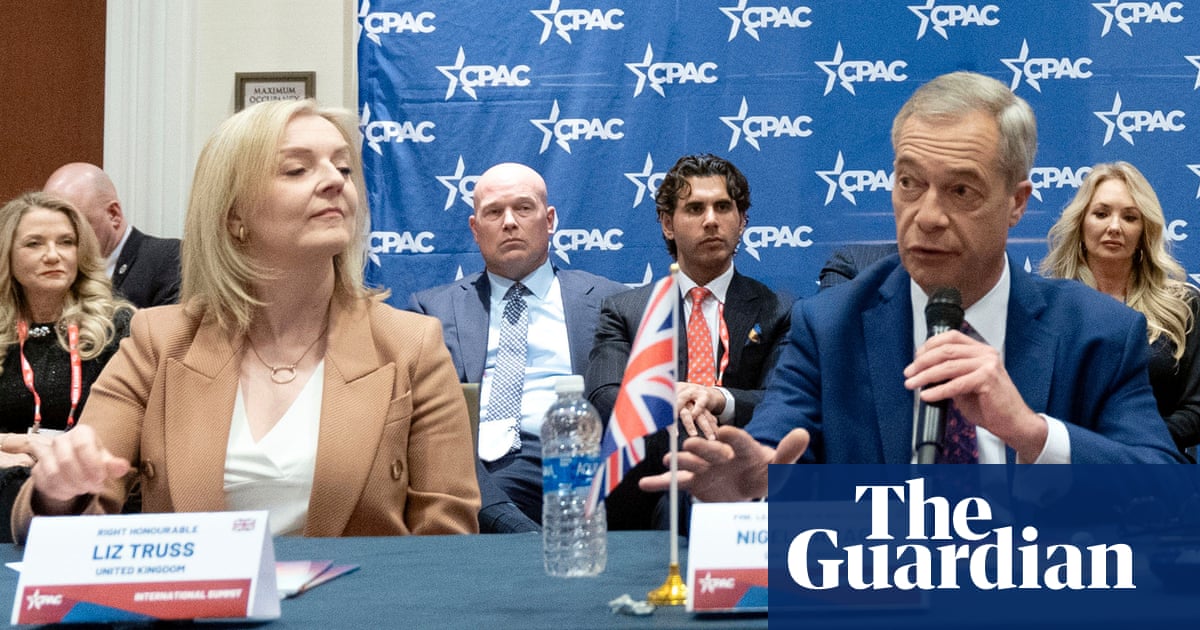Keir Starmer will launch an attack on Nigel Farage by accusing the Reform UK leader of promoting “fantasy” tax-and-spending plans that would unleash a Liz Truss-style economic crisis.
In a fightback against attempts by Farage to win over blue-collar voters with bold promises on taxes and benefits, the prime minister is to say Reform risks spooking the financial markets and driving up mortgage costs for millions of households.
In a speech at a manufacturing business in the north-west of England on Thursday, Starmer will say: “Farage is making the exact same betLiz Trussdid: that you can spend tens of billions on tax cuts without a proper way of paying for it. And, just like Truss, he is using your family finances, your mortgage, your bills as a gambling chip on his mad experiment. The result will be the same.”
The Reform leaderlaid out several promisesduring a speech on Tuesday designed to take advantage of disquiet among Labour voters at the government’s policies on taxes and benefits.
Leading economists said the policies lacked credibility because Farage’s spending plans significantly outstripped any cost savings he planned to deliver.
Having said his party is “coming for Labour” to win over the party’s traditional working-class voters, Farage said that if elected he would scrap a two-child limit on benefits and increase winter fuel payments for pensioners.
The Institute for Fiscal Studies has estimated that Reform’s proposals for deep tax cuts would blow a big hole in the public finances. A promise to raise the tax-free personal allowance alone would cost £80bn.
Farage has pledged to raise revenue to cover his spending plans by finding savings from departmental budgets and by making other welfare cuts. He has also promised to scrap the government’s commitment to reaching net zero emissions by 2050, which he said would save £45bn a year, citing calculations by the Institute for Government.
However, Jill Rutter, a senior fellow at the institute, said Farage had used a figure that included both public sector and private sector investment.
Sign up toBusiness Today
Get set for the working day – we'll point you to all the business news and analysis you need every morning
after newsletter promotion
“The bulk of spending on energy infrastructure is going to come from the private sector – but closing private sector projects won’t generate money for the government,” she said.
Farage admitted that his sums might not add up, but insistedon Tuesday that they gave “an idea of direction, policy, of priorities, of what we think is important, of what we think it is going to cost”.
Labour has faced a fierce public backlash and internal infighting over decisions overseen by Rachel Reeves to means-test winter fuel payments for pensioners and cut disability and incapacity support.
The chancellor has said the decisions are necessary because of a dire economic inheritance from the Conservatives, and to ensure that her self-imposed fiscal rules are met, given the state of the public finances.
Starmer will invoke the economic crisis triggered by Truss’s 2022 mini-budget, when market turmoil drove up UK government borrowing costs and the price of mortgage borrowing for households.
He is to say: “In opposition we said Liz Truss would crash the economy and leave you to pick the bill. We were right. And we were elected to fix that mess. Now in government, we are once again fighting the same fantasy – this time fromNigel Farage.
“Liz Truss bet the house and lost. £45bn in unfunded tax cuts, with no means to pay for them. Markets reacted, the economy tanked and we’re all still paying the price for mortgages, rents and bills that spiralled out of control.
“I won’t let that happen. Labour’s plan for change has stabilised the economy, with growth at the fastest rate in the G7 this year, four cuts to interest rates, and a pay boost for 3.5 million low-paid workers.”
